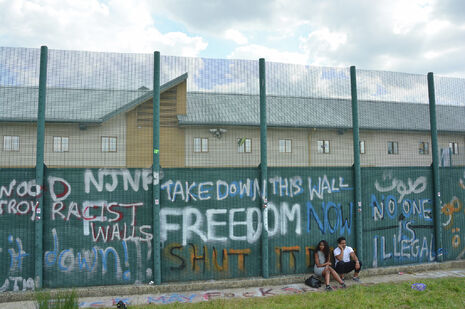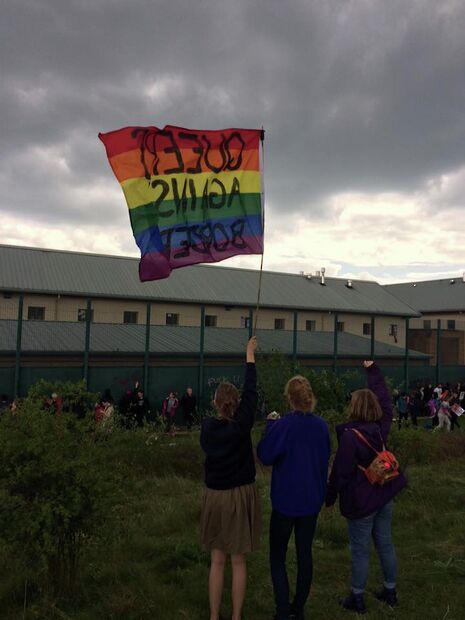Amplifying hidden voices at Yarl’s Wood
CUSU Women’s Officer Audrey Sebantindira records her experience of witnessing and platforming the voices of silenced and marginalised women at Yarl’s Wood Immigration Detention Centre.

Arundhati Roy said there’s no such thing as the voiceless. There are only the deliberately silenced and the preferably unheard. Those held at Yarl’s Wood Immigration Detention Centre for Women easily fall into the latter two categories.
When I ran for the role of CUSU Women’s Officer on a platform of intersectionality, it was with the intention that the CUSU Women’s Campaign (WomCam) would consider, learn from, and platform the voices of migrant and refugee women. Some of these women pass through Cambridge, and I have friends who are children of these women. It was inevitable that I’d want to carry on WomCam’s tradition of taking students to Movement for Justice’s (MFJ) demos at Yarl’s Wood for free.
This protest was the eleventh that had been organised by MFJ, a civil rights movement led by young British activists. Freedom for the detainees at Yarl’s Wood is among its many aims. Yarl’s Wood has been described as a ‘prison’ detaining women who have committed no crime, unless it is illegal to seek a better life for oneself and their family. Accusations of sexual impropriety have also been levelled against the guards at the detention centre. The general consensus among detainees and their allies is that conditions within the centre are unjust.
“Not all activism entails marching through fields, shouting. Sometimes, it involves the simple act of carrying someone else’s voice with you”
So why should WomCam get involved? My own mother told me that our protest would achieve nothing. No government would fall to its knees at the sound of our drums and voices. No walls crumble. Nothing would change.
But upon the arrival of protestors on Saturday, hands – waving and clutching hand-written signs – emerged through gaps in windows in the walls of Yarl’s Wood. It is our duty as feminists (as human beings, even) to extend solidarity to women suffering anywhere. To quote the great black feminist Audre Lorde, “We are not free while any woman is unfree, even when her shackles are very different from [our] own.”
Waving back at those women, even when we couldn’t see anything more than their arms, was an act of political resistance. Yarl’s Wood is hidden deep in the countryside. These women’s voices are never platformed by those who imprison them, nor do the white middle-class feminists with platforms of their own pay them any attention. These are women who are meant to be forgotten. But the simple act of having a crowd of people warmly acknowledge their presence on these shores, sharing a simple and intimate – a human – moment with them is a subversion of every effort by the state to pretend that these women do not exist.

More than that, in protesting we do, in fact, platform their voices. I had never heard of Yarl’s Wood until a few years ago, when I first saw WomCam publicity for a free seat on a minibus to a demo. Encouraged to research Yarl’s Wood I learned not only about the horrific living conditions imposed on detainees, but also about how I could best support them. Which is why I’ve continued the tradition of organising students, and why I’ve chosen to write this piece. Not all activism entails marching through fields, shouting. Sometimes, it involves the simple act of carrying someone else’s voice with you in the hope that another person will hear it and carry it on themselves.
At one particularly moving moment during the demo, women from inside Yarl’s Wood were able to make phone calls to one of the organisers and have their voice amplified for the whole protest to hear. We were able to hear, in their own voices, the hopes and aspirations of these women. I had never seen the idea of platforming marginalised voices manifested so literally.
To end on a personal note, I’ve often thought that one of the only differences between these women and myself is class. My mother sent me to be educated in England because she knew it would improve my life chances, that I had no hope of reaching my full potential speaking only Swahili and living only in my country, Kenya. She could afford to do so, while so many other people are unable to access such an opportunity for their children or for themselves. This is the most emotional reason (although not the only reason) why I platform the voices at Yarl’s Wood.
These women are actively silenced. They are ignored. It takes so little effort on our part to fight against that. To recognise their humanity and their right to have their stories heard. Research Yarl’s Wood. Google Movement for Justice. Be a part of a movement that seeks to humanise us all, even in the face of governments that muzzle dissent
 News / Caius mourns its tree-mendous loss23 December 2025
News / Caius mourns its tree-mendous loss23 December 2025 Comment / Yes, I’m brown – but I have more important things to say22 December 2025
Comment / Yes, I’m brown – but I have more important things to say22 December 2025 News / Clare Hall spent over £500k opposing busway 24 December 2025
News / Clare Hall spent over £500k opposing busway 24 December 2025 Interviews / Politics, your own way: Tilly Middlehurst on speaking out21 December 2025
Interviews / Politics, your own way: Tilly Middlehurst on speaking out21 December 2025 News / King appoints Peterhouse chaplain to Westminster Abbey22 December 2025
News / King appoints Peterhouse chaplain to Westminster Abbey22 December 2025








